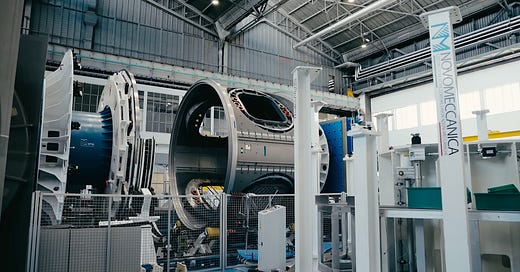Moonshot #35
The space station clock counts down for Axiom Space, SpaceX fights a licensing fine, and Google funds a wildfire prevention constellation.
Hello Continuum readers and Celestial Citizens,
Welcome back to Moonshot where we will give a bi-weekly rundown of all the private sector space news. If you haven’t already, consider becoming a paid subscriber ($6/month) so you can get past that pesky paywall and read the full Moonshot post!

Axiom – Screenwriters might love a “ticking clock,” but space infrastructure firm Axiom definitely does not. The clock we’re referring to in this case is the International Space Station’s retirement in 2030, at which point an Axiom-built station must be ready to take its place. Regretfully, that station’s progress is moving slower than anticipated, with an ominous Forbes article recently revealing that Axiom is struggling to navigate serious cash flow issues. According to the company’s CEO Kam Ghaffarian, Axiom has let go of "about 100" employees this year and has delivered pay cuts to others. The fixed-price $228 million spacesuit contract from NASA may have brought in cash a few years back, but it is potentially diverting resources from the space station program. Selling tickets to the ISS was also an inspired money-making idea, but in the words of a former employee, “there's not a lot of billionaires that want to set aside their life for 18 months to go train to be an astronaut for the ISS." The 400-foot yacht is simply too inviting.
This edition of Moonshot is brought to you by the Space Resources program at the Colorado School of Mines.
Intuitive Machines – NASA and Houston-based Intuitive Machines seem to be getting cozier and cozier with a new contract worth up to $4.8 billion. The mammoth deal raised shares by 52% in aftermarket trading, which is not surprising, given that the funding comes only three weeks after Intuitive Machine secured NASA’s latest CLPS award. Under this new billion-dollar arrangement, Intuitive Machines will deliver lunar relay satellites to orbit as well as provide communication and navigation services as part of NASA’s Artemis endeavors.
Google – The charitable arm of Google, Google.org, has funded a new wildfire-fighting initiative. Led by a nonprofit coalition known as Earth Fire Alliance alongside a Silicon Valley-based startup called Muon Space, FireSat is an LEO constellation with sharp eyes for small fires. The goal is for the satellites to spot fires before they get out of control, not dissimilar to what a fire lookout would do. In addition to funding, Google is also offering up its research team to help develop the technology required to spot small fires. The over 50-satellite constellation intends to get granular, tracking fires the size of a classroom, or 5x5 meters. So think of the potential satellite shame next time you consider using explosives during your gender reveal party.
Planet – And while we’re on the Earth-observation subject, Planet Labs Germany just secured a three-year deal with the German Aerospace Center (DLR) to deliver “nearly daily imagery of Earth’s landmass at approximately three-meter resolution.” In addition to this data, the contract – which is worth an undisclosed amount – requests archives from PlanetScope and RapidEye, spacecraft that began imaging Earth in 2016 and 2009, respectively. According to the DLR’s Earth Observation Department lead, this data will go towards “advancing how we understand climate, security, and our global economy.”
This edition of Moonshot is supported by the Open Lunar Foundation. Open Lunar's work sets precedents, creates pathways, and builds projects that enable a peaceful, cooperative lunar presence. Learn more about Open Lunar's work by joining their upcoming events.
Anduril – A defense firm known for its AI-centric weapons development here on Earth has now announced plans to design and manufacture space systems by late 2025. California-based Anduril Industries intends to bring the autonomous technology it applies in its Earthly endeavors – like its Collaborative Combat Aircraft – to space assets, in the hopes of “improving situational awareness and reducing operator workload.” Anduril’s technology certainly holds promise for faster responses to space-based threats. At the same time, we have to admit the words “autonomous decision making” from a weapons company is a little unnerving.
Keep reading with a 7-day free trial
Subscribe to Celestial Citizen to keep reading this post and get 7 days of free access to the full post archives.






